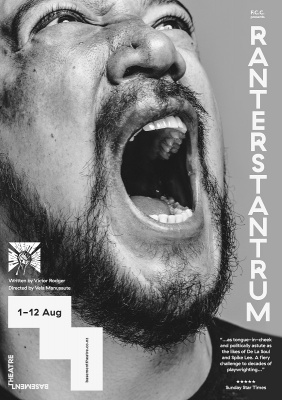RANTERSTANTRUM
Basement Theatre, Lower Greys Ave, Auckland
01/08/2017 - 12/08/2017
Production Details
A Samoan man arrives at a dinner party.
The hosts are nowhere to be seen.
But there’s an untouched chicken on the table.
He begins to eat the chicken, and then….
Victoria University Writer in Residence, Victor Rodger (Black Faggot, My Name is Gary Cooper) presents Ranterstantrum, a provocative, savagely funny exploration of contemporary race relations in Aotearoa.
Ranterstantrum debuted at the New Zealand Festival of the Arts in Wellington in 2OO2. Now, fifteen years later, it finally makes its way to Auckland featuring Ali Foa’i, Robyn Patterson, Jack Buchanan, Bronwyn Ensor and Edwin Beats under the direction of Vela Manusaute (New Generation Arts Laureate, The Factory, Girl on a Corner, Club Paradiso).
“… dark, cutting and ironic vein of humour courses through the drama…” – Evening Post
“… as simultaneously tongue-in-cheek and politically astute as the likes of De La Soul and Spike Lee … a fiery challenge to decades of playwriting…” SUNDAY STAR TIMES…
Basement Theatre
Tuesday, 1-12 August 2017
8pm
Theatre ,
Packs a powerful punch
Review by Ethan Sills 07th Aug 2017
Against a backdrop of hip-hop music, a Samoan man walks on stage in a towel, dancing to the music. It is played for laughs but those slowly fall away when his all black outfit, topped off with a balaclava, is revealed. The scene then jumps into a brutal home invasion that ends with a spine-chilling scream.
That haunting opening is the perfect introduction to Ranterstantrum, the latest work from Pasifika theatre company F.C.C. A revised version of Victor Rodger’s original 2002 script, the dramatic tonal changes in the first scene carry on throughout; the dramatic and comedic regularly clashing in this darkly funny examination of race. At times, it is hard to know whether to laugh or gasp. [More]
Copyright © in the review belongs to the reviewer
Engaging and confronting psychological inquest
Review by Nik Smythe 02nd Aug 2017
Victor Rodger’s first play was originally staged fifteen years ago. This redux production, directed by Vela Manusaute with equal measures of intense drama and irreverent humour, has updated references and technology but essentially remains an ever-timely timeless inquiry into the ongoing issues of racism and sexual violation.
The violent, deeply unpleasant opening scene involves a home invasion and assault, followed up by a typically insensitive police interview with a line of enquiry bordering on victim blaming. Since the action is structured in a piecemeal, paradigm-shifting fashion until the ultimate hidden truth is finally exposed, describing more than the skeleton of the narrative would constitute spoilage.
A seasoned viewer of classic bait-and-switch type thrillers may well see the big reveal coming anyway, but there is a lot more than simple plot twists to unpack here. Taking place over a single evening at a trio of young actors’ pre-opening night party, Rodger’s forthright script directly addresses the oversimplified notion that white people are essentially all racists who believe brown people are all rapists.
Bronwyn Ensor plays Bridget, party host and female lead in the play within the play. Her colleagues are Scott (Edwin Beats), obnoxious party animal, and Joe (Ali Foa’i), a tall, aggressive, camp Samoan. Also in attendance are Bridget’s highly strung sister Lee (Robyn Paterson) and her deferentially sensitive partner Max (Jack Buchanan), with the main conflict erupting after a case of mistaken identity triggers their post-traumatic responses.
Under Manusaute’s creditable direction the cast uniformly portray their respective roles with believable intensity, at times reaching highly-charged emotional levels without ever tipping into histrionic melodrama. A couple of incidental passing roles by Foa’i, particularly his happy Sambo-style KFC drive-thru attendant, evoke the more stereotypically negative images of ethnic minorities, though contextually they play effectively as an acknowledging statement, not as mere gratuitous indulgence.
Variations on the source and nature of prejudice are examined through Lee’s righteous vitriol, justified in her mind by the ordeal she and Max suffered at the hand of a Samoan assailant, compared with Scott’s bigotry, ostensibly stemming from basic insensitivity and wilful ignorance.
However, the most confronting issue that Rodger’s script raises in my mind has less to do with racism and sexual abuse themselves, but rather how a sensitive observer can respectfully and constructively respond to them. Joe and Scott are vocal advocates for the efficacious reclaiming of power through gallows humour, which after certain secrets are revealed is shown to not always be the most helpful of remedies.
Meanwhile, how much of a right do the victims of violent and psychological atrocities have to foster the prejudices their trauma has imbued them with, and at what point do they need to take personal responsibility for moving on for the sake their own quality of life? Every expert’s advice I’ve ever heard fundamentally recommends talking about one’s thoughts and feelings in a safe environment, yet not untypically Bridget and Max are frequently in damage control mode trying to stop their friends expressing too much for their own good.
The upshot of it all as I see it is, regardless of experiences or emerging patterns, every person and situation is essentially unique and must be addressed as such, at face value. In any case, Ranterstantrum stands as a worthwhile, engaging and confronting psychological inquest.
Copyright © in the review belongs to the reviewer
Comments
Make a comment
You must be logged in to post a comment.
Make a comment
You must be logged in to post a comment.






Comments